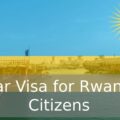
Citizens of the European Union don’t require a visa to stay in Qatar for up to 90 days within any 180 days, making it convenient for tourists and business travelers alike.
Upon arrival at Qatari airport, travelers from the EU will be given a visa on arrival under the visa waiver program.
To avoid waiting in long queues upon arrival to Qatar, all EU citizens can apply for a Qatar visa earlier – at the embassy or online.
NOTE: If your planned visit to Qatar is longer than the permitted 90 days, you must apply for a suitable visa at the nearest embassy or online.
This visa exemption makes traveling between Qatar and the European Union member states easier than ever.
Visitors from the EU must make sure their passports are valid for at least 6 months from the date of arrival.
TIP: Always check the Qatar visa requirements specific to your nationality and prepare the necessary documents well in advance to avoid last-minute stress.
Visa-Free Entry to Qatar for EU Citizens
Most EU citizens can use the visa waiver option and obtain a Qatari visa on arrival.
This solution is especially convenient for travelers who prefer last-minute trips.
Citizens from the following EU countries can apply for a Qatar visa on arrival:
- Austria
- Belgium
- Bulgaria
- Croatia
- Cyprus
- Czech Republic
- Denmark
- Estonia
- Finland
- France
- Germany
- Greece
- Hungary
- Ireland
- Italy
- Latvia
- Lithuania
- Luxembourg
- Malta
- Netherlands
- Poland
- Portugal
- Romania
- Slovakia
- Slovenia
- Spain
- Sweden
Keep in mind that Qatar entry policies can change over time, so it is recommended that you verify the current requirements closer to your travel date.
You can stay in Qatar for up to 90 days, but your visa waiver will become invalid as soon as you leave Qatar, as it allows a single visit to the country.
NOTE: This visa-free entry option is available only for travel related to tourism, sightseeing, and business. You need a different visa for employment or residence.
Qatar Visa on Arrival Application Process
EU citizens can opt for a Qatari visa on arrival, a flexible alternative to regular visas.
Once you land at the Qatari airport, follow this simple guide:
- Prepare documents such as a valid passport, face photograph, return ticket, and proof of accommodation in Qatar.
- Make your way to the immigration desk upon arrival in Qatar, where you will begin the entry process.
- Present your documentation for verification purposes when you reach the immigration officer.
- Answer any questions posed by the immigration officer, providing clear and accurate information.
- You will receive a visa stamp that permits a 90-day stay in Qatar once the payment is complete.
Advantages of visiting Qatar visa-free:
-
- Less paperwork needed.
- Ideal for last-minute travel plans.
- Flexible option allowing changes.
- More cost-effective than pre-arranged visas.
Disadvantages of Qatar visa on arrival:
-
- Processing times are unpredictable due to changing traffic.
- Initial stay is restricted to 90 days.
- Long waiting times in lines upon arrival.
- Requires complete documentation.
Additional Considerations for Qatar Visa on Arrival
While obtaining a Qatar visa on arrival is straightforward, there are a few things to keep in mind for a problem-free process:
- Remember a few basic Arabic phrases to communicate with locals easily.
- Visit the Qatari Ministry of Interior or do it online to extend your stay.
- Learn about Qatar’s customs rules, especially for money, alcohol, or tobacco.
Following these tips is essential for a hassle-free travel experience to Qatar.
By preparing in advance, you can avoid unnecessary delays and complications at the immigration desk.
NOTE: Travelers to Qatar should reach out to their airline for detailed information about specific guidelines on prohibited items.
Documents Required to Get a Qatar Visa
When applying for a Qatar visa, EU citizens should have the correct documentation on hand.
Thoroughly check your documents before traveling to Qatar, as having insufficient files can lead to entry denial and visa refusal.
-
- Passport valid for at least 6 months from the date of entry into Qatar with blank pages for visa stamps.
- Return or onward travel ticket proving that you have plans to leave the country.
- Accommodation evidence of where you will be staying during your time in Qatar.*
- Financial proof showing that you have sufficient funds to cover your expenses.
- Recent passport-sized photographs may be requested, taken in color on a white background.
*The hotel booking must be made via the Discover Qatar platform.
It’s important to check the latest entry requirements and guidelines to avoid issues, as they may change over time.
NOTE: While travel insurance is recommended for EU citizens traveling to Qatar, it is not mandatory.
How to Apply for a Qatar Visa Before Travel
Applying for a Qatar visa before traveling can be the best approach for travelers who prefer organizing their travel documents in advance.
Getting a visa before leaving for Qatar will also allow you to avoid waiting in queues at the immigration desk at the airport.
There are two ways to secure a Qatar visa before your departure: online applications and embassy applications.
Qatar eVisa Application
- Access the Official Website: Visit the official Hayya portal to start the application.
- Create an Account: Register by providing your email and setting up a password.
- Fill Out the Form: Complete the application with your personal and travel details.
- Upload Required Documents: Scan and upload digital copies of required documents.
- Make Payment: Pay the visa application fee online using a credit or debit card.
- Submit the Application: Review all information for accuracy and submit your application.
- Receive Confirmation: Once approved, download and print your electronic Qatar eVisa.
Getting a Qatar Embassy Visa
- Locate the Nearest Embassy: Find the Qatari embassy or consulate for visa processing.
- Schedule an Appointment: Contact the officials to arrange a meeting.
- Prepare Documents: Gather the documents and check if they’re appropriate.
- Attend Appointment: Visit the embassy on your scheduled date to submit your visa application.
- Pay the Visa Fee: Pay for the visa application using cash or a credit card.
- Await Processing: Allow time for the embassy to process your visa application.
- Collect your visa: Visit the office to get your visa or have it sent to you by mail.
You can choose any of the two available methods of getting a Qatar visa or obtain your visa waiver on arrival.
TIP: When applying for a Qatar eVisa, make sure you’re using a trusted website for the visa application process to avoid fraud.
Qatar Visa Denial – What to Do?
Unfortunately, not every visa application is successful. If your Qatar visa is denied, stay calm and appeal the refusal.
Incomplete documentation leads to a visa denial, while untrue information (or spelling errors) between your application and supporting documents can raise concerns.
Previous visa violations in Qatar or other countries may also negatively impact your application.
Security or criminal concerns, including any history of criminal activity or being on a watchlist, may result in a denial.
If you have received a visa refusal message, follow these tips:
- Correct any mistakes or provide missing documents.
- Contact the nearest Qatari embassy for further clarification and reapply.
- Consider seeking professional assistance for your next application.
It’s essential to comply with the visa requirements and guidelines to increase your chances of approval.
The visa application process should be smooth and problem-free, with thorough preparation and attention to detail.
Understanding Health Regulations in Qatar
EU travelers are encouraged to review Qatar’s latest health regulations at the Ministry of Public Health website for a safe and enjoyable trip.
It’s essential to check for any required vaccinations or health certificates needed for entry to Qatar.
Staying informed about potential health risks or outbreaks in the region can help ensure a smooth journey.
Travelers should also consider travel insurance that covers medical expenses abroad.
Qatari Government Websites and Online Services
Qatar offers a range of online services to streamline interactions with the government.
These government websites allow travelers to apply for visas, track progress, and access services without visiting physical offices.
List of the online Qatar government services:
- Hayya: Streamlines the application process with an easy-to-follow online form.
- Hukoomi: Provides residents and visitors in Qatar with access to information.
- MOI: Oversees internal security, public safety, and immigration processes.
- MOFA: Provides diplomatic information and facilitates international engagement.
- MOPH: Formulates health regulations, ensuring public health safety.
Using e-government services in Qatar saves time and effort by eliminating the need for physical visits to government offices.
NOTE: The online services of Qatari authorities are available 24/7, providing convenience and flexibility for users worldwide.
Qatar Embassies in Europe
When planning a visit to Qatar, having access to embassy information can be crucial for obtaining visas and other consular services.
Below is a list of Qatari embassies located in Europe, along with their addresses.
List of Qatari Embassies in the EU:
- Austria: Schottenring 10/7a, 1010 Vienna
- Belgium: Avenue Franklin Roosevelt 79, 1050 Brussels
- Bulgaria: 4 Vassil Aprilov, 1504 Sofia
- Croatia: Baboniceva 115, 10000 Zagreb
- Cyprus: 1 Qatar Street Strovolos, 2054 Nicosia
- France: 1 Rue de Tilsitt, 75008 Paris
- Germany: Hagenstraße 56، 14193 Berlin
- Greece: Perikleous 2 Neo Psichiko, 15451 Athens
- Hungary: Andrássy út 114, 1062 Budapest
- Italy: Via Goito 50/52, 00185 Rome
- Netherlands: Borweg 7 LR ‘S-Gravenhage, 2597 The Hague
- Poland: Książęca 15, 00498 Warsaw
- Romania: Strada Venezuela 10A, 011834 Bucharest
- Spain: Paseo de la Castellana 15, 5ª planta, 28046 Madrid
- Sweden: Klarabergsviadukten 63, 111 64 Stockholm
Consular services, such as visa applications and document issuance, can typically be managed through these embassies.
FAQs
- Do EU citizens need a visa to travel to Qatar?
EU citizens can receive a visa waiver on arrival, allowing entry for up to 90 days within 180 days. - How long does it take to process a Qatar visa application?
Qatar eVisa applications can take 1-5 business days, while embassy applications may take longer (at least 2 weeks). - What documents are required for a Qatar visa?
Commonly required documents include a valid passport, face photos, flight tickets, and proof of accommodation. - Can I apply for a Qatar visa on arrival?
Qatar visa waiver on arrival is available for all nationalities from the European Union. - Can I extend my stay in Qatar once I am there?
Extensions are possible, but you must consult with immigration authorities in Qatar well before your visa expiry date. - Is travel insurance mandatory for EU citizens entering Qatar?
While not mandatory, travel insurance is highly recommended for EU citizens to cover medical expenses and unforeseen events during travel.
Conclusion
As a citizen of the European Union, you should be familiar with the Qatar visa policy before traveling to avoid trouble upon arrival.
If you prepare the required documents, you’ll obtain a free visa on arrival.
It’s possible to get a visa from the embassy or online for travelers who prefer to travel prepared and avoid queues.
Remember that staying informed about potential entry regulation changes can benefit your travel to Qatar.








